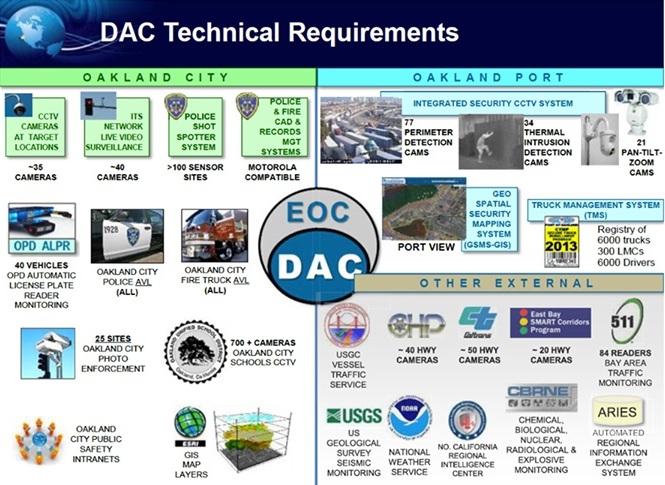
Since it was first proposed last summer, residents in Oakland, Calif., have protested the construction of a citywide surveillance system known as the Domain Awareness Center, or DAC, reasoning that the center has the potential to violate their privacy and civil rights.
Scheduled to go live in July 2014, and funded almost exclusively by a $10.9 million grant from the Department of Homeland Security, the DAC will link cameras around the city with ShotSpotter gunshot detectors, license plate readers, Geographic Information Systems mapping, social media feeds and more.
Though the city says the goal is to monitor the city 24/7 for crime and to improve emergency response times, many privacy advocates, such as Brian Hofer, the media contact for the Oakland Privacy Group, say many residents are concerned because the city’s safety is not the true goal of the center.
“We have access to a large group of internal documents obtained through a Public Records Act request,” Hofer said. Thousands of internal emails from City of Oakland staff show that the true intent of the Domain Awareness Center is monitoring political demonstrations.
Hofer pointed to a report in the East Bay Express, which said that upon review of more than 3,000 emails, there was not a single mention of homicide, burglary, rape, assault, “Yet council members are taking the public position that the DAC will improve Oakland’s crime problem.”
The problem with this, Hofer said, is that it’s almost impossible to reduce crime with the DAC, since “There will be no cameras in residential areas where burglaries occur, and the other crime metrics, such as homicides, dropped dramatically in the last year, without the DAC’s implementation.”
Hofer told MintPress that there is a “great potential for abuse by those with the data (stalking, identity theft, etc.),” and pointed to National Security Agency whistleblower Edward Snowden’s revelations as an alarming wake-up call for the public on just how easily the NSA and other government agencies can monitor our every move. Something Hofer says they are doing “with complete disregard for the U.S. Constitution and other laws.”
Besides privacy concerns, groups such as Oakland Privacy have also pointed out that the building of the center by military contractors violates Oakland’s Nuclear Free Zone ordinance, which says that the city “will in no way be complicit in building nuclear weapons and has refused to work with any nuclear weapons contractors.”
Though it may seem odd for a city to have a law banning nuclear weapons contractors, Oakland has a history of taking strong progressive stances on issues, from marijuana legalization to South African divestment, to anti-Immigration and Customs Enforcement raids.
But to build the DAC, Oakland Privacy says “city staff has been looking for ways to use nuclear weapons contractors to build their vision of an all-knowing Orwellian surveillance apparatus.
“The city’s first contractor to work on the DAC, military giant [Science Applications International Corporation], was removed from the contract after it’s work on nuclear weapons became public,” the group said. “SAIC also perjured themselves by signing a statement that they did not violate the Nuclear Free Zone ordinance. But public records request documents indicate that city staff knew all along that SAIC was in violation of the ordinance.”
When it was discovered that city staff had been helping SAIC officials search for loopholes to bypass the ordinance, the city allowed SAIC to finish building a major phase of the DAC project and paid them the full $2.6 million for their work before ending their contract.
Now, the Oakland Privacy Group says it believes city staff are attempting “similar maneuvers with Schneider Electric” in order to complete the DAC project, despite the Nuclear Free Zone ordinance.
On Tuesday, Hofer and other privacy advocates met with City Council members who agreed to listen to their concerns.
“The four members of the Public Safety Committee asked tough questions last night,” Hofer said, “and clearly placed weight on our legal argument.”
However, he said that while city staff originally reported that Schneider Electric was in compliance with the Nuclear Free Zone ordinance, after Oakland Privacy submitted their evidence proving otherwise, some council members began to backtrack.
Hofer said he has met with many of council members individually already, and has meetings planned with those members he has not met with yet. If the city does decide to continue on with the DAC, Hofer says the group will respond with legal action.
In addition to the U.S. Constitution’s First, Fourth and Fifth Amendments, Hofer said that California’s Constitution has even stronger language protecting constituents privacy. He said even if the city doesn’t agree to cease and desist building the DAC, “state law will support our legal position.”


